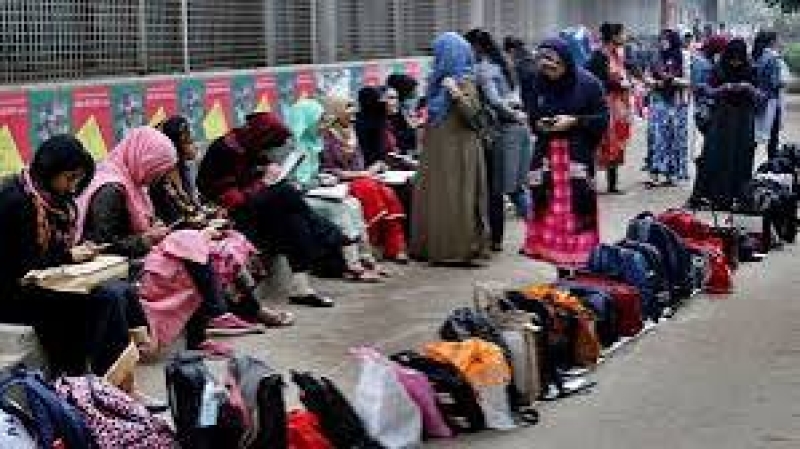- India Sees 9% Drop in Foreign Tourists as Bangladesh Visits Plunge |
- Dhaka Urges Restraint in Pakistan-Afghan War |
- Guterres Urges Action on Safe Migration Pact |
- OpenAI Raises $110B in Amazon-Led Funding |
- Puppet show enchants Children as Boi Mela comes alive on day 2 |
Educated but Unemployed: Joblessness Surges Among Graduates in BD

Tanvir Rahman, a 26-year-old business graduate, holds a degree and ambitious dreams. However, after two years of job hunting, he's still waiting for his first real opportunity.
Tanvir’s situation is far from unique.
Across Bangladesh, an increasing number of graduates are facing rejection, disillusionment, and a shrinking pool of job opportunities. The promise of higher education is not living up to expectations, as it fails to provide graduates with meaningful career paths.
“I graduated two years ago, but I’ve yet to find a stable job,” Tanvir shared. “Many companies require years of experience, which fresh graduates like me simply don’t have.”
Despite their degrees, many young graduates in Bangladesh are struggling to secure employment, highlighting a critical issue within the country’s labor market.
According to the latest report from the Bangladesh Bureau of Statistics (BBS), the unemployment rate among educated youth—graduates and postgraduates—has surged to 11%, significantly higher than the overall national unemployment rate of 4.2%.
The situation has worsened due to broader economic challenges, the rise of automation, and a lack of skill-based training. The latter half of 2024 and early 2025 have been particularly grim for job seekers, as job advertisements in both public and private sectors have sharply decreased.
Private sector investment remains sluggish as well. Data from the Bangladesh Bank revealed a decline in private sector credit growth, from 9.86% in August to 7.66% in November. This downward trend continued through September and October, well below the central bank’s target of 9.8% growth by December.
Bangladesh’s total labor force stands at 7.34 crore, with 26.3 lakh currently unemployed, according to the BBS. During the July-November period of the current fiscal year, capital machinery imports dropped by 21.9%, reflecting a slowdown in industrial expansion.
While public sector jobs account for only around 6% of total employment, the private sector is expected to absorb the majority of the country's workforce. Yet, a mismatch persists between academic education and industry needs, with limited job opportunities exacerbating the problem.
“Universities in Bangladesh produce thousands of graduates each year, but many lack the practical skills employers are looking for,” said Mahmudul Hasan, an HR executive at a multinational company in Dhaka. “There’s a significant gap between academic learning and market demands. Employers want candidates with technical and digital skills, problem-solving abilities, and real-world experience.”
Government initiatives, such as internship programs, vocational training, and digital skill development courses, have been introduced to address the issue. Yet, experts argue that these efforts fall short without stronger collaboration between academic institutions and industries.
Economists warn that continued youth unemployment could lead to long-term consequences, including social unrest, brain drain, and economic stagnation. Many disillusioned graduates are seeking opportunities abroad, contributing to a growing outflow of skilled talent.
A recent BBS report revealed that the unemployment rate among university graduates has climbed to 12.3%, far exceeding the national average.
“I completed my degree in Business Administration two years ago, but I’m still struggling to find a stable job,” said Fahim Rahman, a graduate from a renowned university in Dhaka. “Employers often demand experience, but how are we supposed to gain it if no one is willing to hire us?”
Employers continue to express concern that Bangladesh’s education system does not adequately prepare students for the job market. Many companies now prefer candidates with hands-on experience or vocational training over those with only theoretical knowledge.
Meanwhile, the rise of automation and artificial intelligence is reducing the need for traditional white-collar jobs, further constraining job opportunities for graduates.
Despite government programs aimed at improving employability, such as those spearheaded by the National Skills Development Authority (NSDA), many graduates continue to struggle to find jobs that match their qualifications.
In December 2023, Bangladesh reported a total of 70.98 million employed persons, with a labor force participation rate of 61.7%.
Experts stress that without comprehensive reforms in both education and employment policies, Bangladesh's aspirations of becoming a middle-income country may remain unattainable. The growing number of unemployed graduates is fast becoming one of the country’s most pressing economic and social challenges.
“This crisis in graduate employment isn’t just a youth issue—it’s a national issue,” said a Dhaka-based economist. “If we don’t act now, we risk long-term economic stagnation.”
The government has acknowledged the crisis and introduced initiatives to promote entrepreneurship, vocational training, and digital skills development. At the same time, private companies are offering internships and skill-building workshops to help bridge the gap between education and employment.
However, concerns are growing about the rising trend of 'overqualification,' where graduates are forced to accept jobs far below their academic qualifications.
“I have a master’s degree in Business Administration, but I’m currently working as a customer service representative,” said Rabbi Dewan, a recent graduate. “I had no choice but to take this job because finding one that matches my qualifications has been incredibly difficult.”
Experts emphasize that addressing the graduate employment crisis requires a multi-faceted approach, including overhauling the education system, improving career counseling services, and boosting investment in job creation.
As more graduates continue to enter the job market, pressure is mounting on policymakers, businesses, and academic institutions to find sustainable solutions.
While the challenges are significant, the solutions are within reach. With stronger collaboration and strategic planning, Bangladesh has the potential to transform its educated youth into a powerful engine of growth and innovation.

